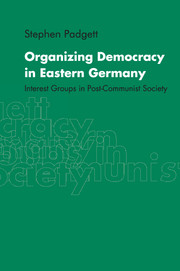Book contents
- Frontmatter
- Contents
- List of tables
- List of abbreviations and glossary
- Introduction
- 1 The emergence of civil society
- 2 Socio-economic foundations
- 3 Organization
- 4 Participation and the logic of collective action
- 5 Group dynamics
- 6 Organized interests, the state and public policy
- Conclusion
- References
- Index
1 - The emergence of civil society
Published online by Cambridge University Press: 22 September 2009
- Frontmatter
- Contents
- List of tables
- List of abbreviations and glossary
- Introduction
- 1 The emergence of civil society
- 2 Socio-economic foundations
- 3 Organization
- 4 Participation and the logic of collective action
- 5 Group dynamics
- 6 Organized interests, the state and public policy
- Conclusion
- References
- Index
Summary
As we saw in the introduction, association was initially ascribed a key role in democratic transition. The rise of Solidarity alongside the crisis of the communist state in Poland in the 1980s and the emergence of undercurrents of opposition elsewhere in east/central Europe fostered a wide-spread belief in the potential of autonomous associational activity for hastening the demise of communism and creating the conditions for post-communist democracy. This belief was buttressed by changing perceptions of the power structure of the communist state, as the notion of totalitarianism gave way to a more pluralist conception of group interests jostling for influence within a more differentiated political system. Perceptions of oppositional activity as the seedbed of civil society were thus reinforced by a pluralist analysis of group mobilization in the internal dynamics of the regime, fuelling the belief in association as the mainspring of post-communist politics and society.
In retrospect, the belief in opposition movements as the foundation of post-communist civil society can be seen to have been greatly exaggerated. Whilst other revolutions have come about through the mobilization of new social formations, the democratic revolutions in east/central Europe were precipitated by the enfeeblement and collapse of regimes through economic sclerosis. In some countries, democratic revolution was not accompanied by mass mobilization; even where it occurred, it was rarely much more than a sideshow to the main event. The course which the revolutions took, and the outcome, was dictated much more by the interaction of elites.
- Type
- Chapter
- Information
- Organizing Democracy in Eastern GermanyInterest Groups in Post-Communist Society, pp. 28 - 51Publisher: Cambridge University PressPrint publication year: 1999



